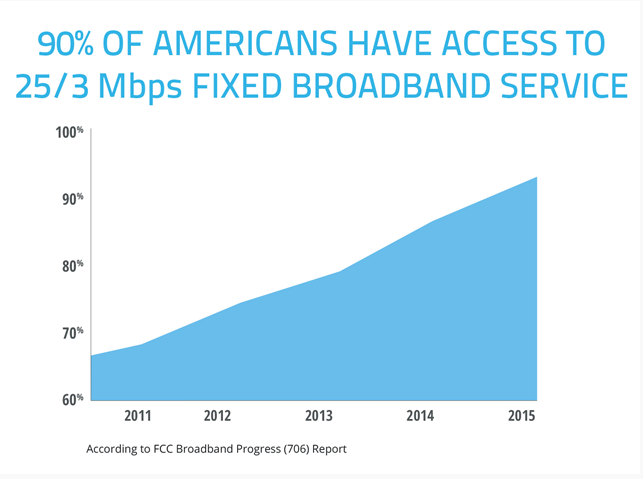Stakeholders Vet FCC Deployment Report

The smarter way to stay on top of broadcasting and cable industry. Sign up below
You are now subscribed
Your newsletter sign-up was successful
The FCC's official adoption of its latest annual report on broadband deployment--its baseline finding had been known for weeks--drew immediate response from fans and foes of the decision, with the foes weighing in in particularly large numbers.
The principal finding was that, much to the continued consternation of broadband companies investing billions, advanced telecom is not being provided in a reasonable and timely fashion. Per the 1996 Telecommunications Act, that negative finding authorizes the FCC to take steps to rectify the situation, though Republican legislators and FCC commissioners have argued that it was meant to be a deregulatory provision rather than a regulatory one.
Today's (Jan. 28) flashpoint for the report was the official vote by the commissioners adopting it and their chance to weigh via public statements at the meeting.
Following that vote, stakeholders offered up their own assessments.
The National Cable & Telecommunications Association, whose members are among those spending billions to deploy broadband, was ready with tough rhetoric and even the FCC's own data (see chart at left) to make its point.
"Any cursory and objective review of the statistics, even those from the Commission itself, should compel an overwhelming affirmative conclusion," NCTA said. Unfortunately, what should be an unbiased, data-driven assessment has largely been supplanted by an ends-driven political process used to justify the ever-expanding reach of the FCC’s regulatory authority. The result is the unsupportable conclusion reached today by an FCC majority that broadband deployment in the U.S. is not reasonable and timely.
Republican leadership on the House Energy & Commerce Committee was not pleased with the finding.
The smarter way to stay on top of broadcasting and cable industry. Sign up below
“Moving the goalposts in the middle of the game is not productive, and it is not fair. When the FCC changed its definition of broadband Internet in 2015, it did not act out of necessity or market need, but rather to expand its power over job creators and Internet service providers,” said Energy and Commerce Committee Chairman Fred Upton (R-Mich.),
Communications Subcommittee Chairman Greg Walden (R-Ore.), and subcommittee vice chairman Bob Latta (R-Ohio). “We live in the most innovative and dynamic country in the world. Ensuring that all Americans have access to broadband Internet has long been a priority of this committee. The law is clear - the commission's job is to objectively look at the state of deployment and empower America's broadband infrastructure builders to invest. Today's decision instead empowers only the FCC's bureaucracy."
"The FCC’s latest broadband report fails to fully acknowledge the massive investment and lightning speed with which providers are deploying broadband nationwide," said Jonathan Spalter, chair of Mobile Future. "Rather than embracing the world-leading deployment of faster, more robust mobile networks, the report is in many places dismissive of the important role mobile plays in streamlining our lives."
By any metric, wireless deployment is timely and reasonable in the United States and we are disappointed that the FCC is unwilling to acknowledge the facts. In any event, we urge the FCC to re-double its efforts to ensure there is sufficient spectrum to meet consumer demand, streamline our nation’s infrastructure policies, and allow the consumer-focused mobile wireless ecosystem to continue to grow and innovate.”
"By any metric, wireless deployment is timely and reasonable in the United States and we are disappointed that the FCC is unwilling to acknowledge the facts," said CTIA. "In any event, we urge the FCC to re-double its efforts to ensure there is sufficient spectrum to meet consumer demand, streamline our nation’s infrastructure policies, and allow the consumer-focused mobile wireless ecosystem to continue to grow and innovate.”
"A holistic analysis of the U.S. broadband infrastructure should reach the conclusion that we’re certainly making “reasonable progress” as a nation," said ITIF's Doug Brake. "Policymakers should neither abdicate their responsibility to encourage deployment of better technology nor over-regulate. They should instead facilitate continued progress in a competitive marketplace, and find those areas where government should provide help. Congress should give the FCC clear, but bounded, jurisdiction so the FCC doesn’t have to rely on these sorts of theatrics to pursue good policy."
But not everyone was complaining.
The Competitive Carriers Association praised the FCC report and said there was "an urgent need to ensure individuals across the country have access to advanced telecommunications capabilities.... The message and policy direction should be clear - this continuing digital divide should incite the Commission to ensure that all Americans have access to advanced broadband services – both fixed and wireless."
Free Press Policy Director Matt Wood also accepted the FCC findings as evidence of a digital divide.
“The FCC’s report today provides another reminder that too many Americans have no option for high-speed, modern broadband," he said in a statement. "This lack of availability is indeed an issue, especially in rural areas and on tribal lands."
The Information Technology and Innovation Foundation said the FCC conclusion was based on a "highly strained" reading of the evidence.
Contributing editor John Eggerton has been an editor and/or writer on media regulation, legislation and policy for over four decades, including covering the FCC, FTC, Congress, the major media trade associations, and the federal courts. In addition to Multichannel News and Broadcasting + Cable, his work has appeared in Radio World, TV Technology, TV Fax, This Week in Consumer Electronics, Variety and the Encyclopedia Britannica.

